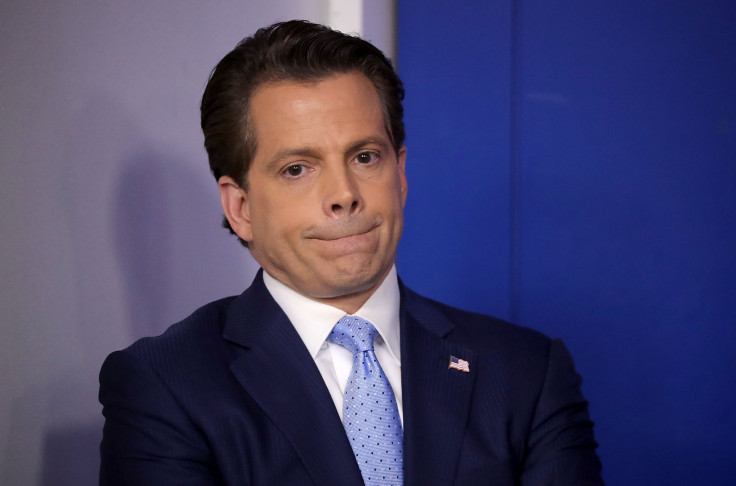Anthony Scaramucci Says New Yorker Made Off The Record Conversation Public

Ryan Lizza, a Washington correspondent for the New Yorker, published an article Thursday documenting a reportedly “off the record” telephone conversation that he had with White House Communications Director Anthony Scaramucci, Wednesday night. Hours after the article was published, Scaramucci sent out the following tweet that clearly suggested he expected the details of the interaction to remain private.
I made a mistake in trusting in a reporter. It won't happen again.
— Anthony Scaramucci (@Scaramucci) July 28, 2017
The article was published after Lizza, who is also a contributor for CNN, went on-air to talk about the long late night conversation he had with Scaramucci, referencing in the process, a cryptic tweet sent out by the latter which seemed like a veiled attack against White House Chief of Staff Reince Priebus — a tweet he then deleted and replaced with another one.
Read: Anthony Scaramucci Called Trump A 'Hack Politician' Before Joining White House
Anthony Scaramucci accused Reince Priebus of a felony - then deleted the tweet pic.twitter.com/Un3FoqOsA4
— Elizabeth #WomensRightsAreHumanRights (@TheHopsbride) July 27, 2017
Wrong! Tweet was public notice to leakers that all Sr Adm officials are helping to end illegal leaks. @Reince45 pic.twitter.com/AB0reseuX1
— Anthony Scaramucci (@Scaramucci) July 27, 2017
During the discussion, Scaramucci called the show makers to deny the floating rumors that there was bad blood between him and Priebus. “He’s the chief of staff, he’s responsible for understanding and uncovering and helping me do that inside the White House, which is why I put that tweet out last night,” Scaramucci said.
However, Lizza later clarified in his article that in the conversation that he had earlier with Scaramucci, the businessman-turned government official was furious with Priebus, someone he believed was behind key intel leaking from inside the White House. He threatened Lizza to make him reveal the name of the source who had told him that President Donald Trump had dinner with the first lady, Scaramucci, Fox News host Sean Hannity and the former Fox News executive Bill Shine.
“What I’m going to do is, I will eliminate everyone in the comms team and we’ll start over,” Scaramucci said, the New Yorker article reported. “I ask these guys not to leak anything and they can’t help themselves. You’re an American citizen, this is a major catastrophe for the American country. So I’m asking you as an American patriot to give me a sense of who leaked it.”
Read: Anthony Scaramucci Net Worth, Donald Trump Ally Who Caused 3 CNN Reporters To Resign
On not getting a definitive answer from Lizza, Scaramucci went on to speculate on the possibilities that the leaker might have been Priebus. “I’ll get to the person who leaked that to you. Reince Priebus — if you want to leak something — he’ll be asked to resign very shortly,” Scaramucci told Lizza. Later, Scaramucci apologized for using “colorful” language in the conversation he had with Lizza, where he called Priebus “a f------ paranoid schizophrenic, a paranoiac.”
I sometimes use colorful language. I will refrain in this arena but not give up the passionate fight for @realDonaldTrump's agenda. #MAGA
— Anthony Scaramucci (@Scaramucci) July 27, 2017
After Scaramucci’s apparent shock at the fact that Lizza made their “off the record” conversation public, Fox News Chief Political Anchor Bret Baier pointed out that the White House communications director should have been wiser and not assumed that the interview he had with Lizza was confidential.
So you assumed it was off-the-record? With the New Yorker -had it been before without u saying it? Come on the show tonight- I'm live at 11p https://t.co/XauFUnkFIg
— Bret Baier (@BretBaier) July 28, 2017
So did Scaramucci fail to grasp what “off the record” really means? According to Roy Greenslade, Professor of Journalism at City University London “off the record” does not necessarily mean that the journalist would not make one’s comments public; it simply means that the name of the source would not be revealed.
Even though Lizza made no efforts to veil Scaramucci’s identity by calling him “a White House official,” it was understandable since the latter’s comments were extremely opinionated and hence, could not be kept under the wraps of anonymity.
Greenslade also stated that comments made “off the record” may be attributed to a specific person when the authenticity of the story is on the line, which was also the case here. “The process of verification was therefore bound to lead to the identity of the quoted person emerging in daylight,” he wrote.
Finally, a reporter does “not grant the person [source] any guarantee of confidentiality” when they urge their source to speak up freely because their comments were “off the record.”
"Off the record is criticised by some because it allows attacks to be made without accountability," Ex-political editor Jane Merrick wrote in an Independent article. "Yet to most reporters, it is an essential part of freedom of speech – it affords anonymity to sources to expose wrongdoing and question those in power without fear of recrimination."
© Copyright IBTimes 2024. All rights reserved.






















